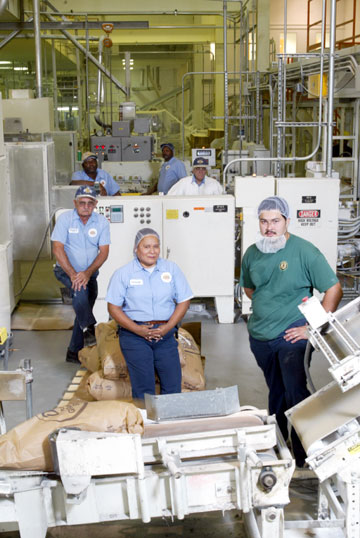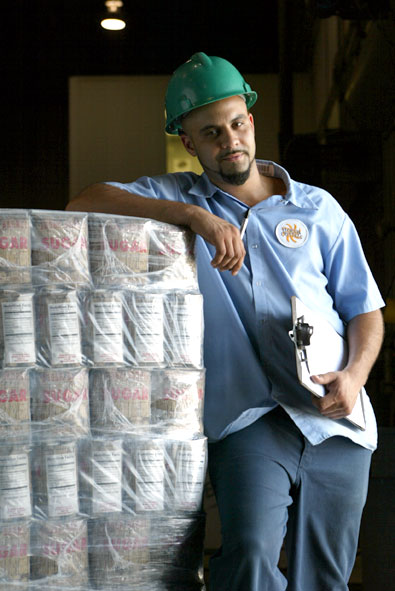|

Hundreds of jobs at Florida Crystals in South Bay, FL could be
wiped out by unfair trade deals like CAFTA. Local 2152
members process sugar into dozens of consumer products.
Front row from left, Enrique Herrera, Consuelo Calderon,
Jorge M. Huertas Jr. Back row from left, Mark Antoine,
Henry Grizzle and Remberto Rubio.
The
proposed Central American Free Trade Agreement (CAFTA) will
devastate
the 1,500 IAM
members and their families working in South Florida’s sugar
industry and communities. The disastrous effects won’t end
there. “CAFTA will crush the sugar industry in the United
States,” said Southern Territory GVP Bob Martinez.
CAFTA is a
so-called “free” trade agreement modeled after the North
American Free Trade Agreement (NAFTA) that includes the United
States, El Salvador, Nicaragua, Guatemala, Honduras and Costa
Rica. Like NAFTA it will be disastrous for agriculture, small
farmers and working people in the United States. Hundreds of
thousands of jobs have been lost, family farms foreclosed, and
public interest laws overturned or challenged in secret NAFTA
courts. Despite this dismal record, the Bush Administration
wants to expand NAFTA to Central America and the rest of the
Western Hemisphere.
Continued job
loss isn’t the only problem with agreements like CAFTA. “The use
of child labor is rampant in planting and harvesting sugar
cane,” said Michael Bochenek, in a report on El Salvadorian
child labor from Human Rights
Watch. Children begin wielding foot-long machetes at
the age of five. The average cane worker's salary is about $75 a
month.

Orlando Rodriguez with one of
many Florida Crystals sugar products.
A look at today’s gas prices shows the dangers of becoming
dependent on foreign producers for basic commodities like oil
and sugar. Trade
agreements modeled after NAFTA will push the U.S. toward
dependence on foreign food supplies as well.
Additional
imports from the CAFTA countries will flood the U.S. market,
forcing whole states or regions to exit the sugar business.
From the
beginning of CAFTA negotiations, the Bush administration made
clear that completion of CAFTA is crucial to move the Free Trade
Area of the Americas (FTAA) negotiations forward. CAFTA was
signed on May 28, 2004 and a vote on the agreement will occur
before the November election.
The White House
has 60 days to send the legislation to Congress, which then has
90 days to consider it. Thanks to the so-called “Fast Track”
trade bill passed last year, members of Congress can only cast a
“yes” or “no” vote on such trade deals. No amendments can be
added.

U.S. Sugar produces more than ten percent of America’s sugar
products. CAFTA puts more than 1,000 jobs at U.S. Sugar’s giant
operation in Clewiston, FL in jeopardy, including Local 57
members Preston Thompson, left, and Angela Pourch.
|